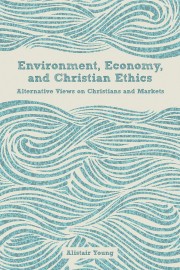Reviewed by Andrew J. Spencer
This recent volume by Alistair Young is an attempt to tie together the issues of environment, economics, and Christian ethics. Young is a retired economist, with experience teaching economics in several countries. His extensive experience in economics is evident throughout the text, as there is a decided emphasis on economics over the other two title subjects. Young has three purposes for writing this volume. First, he makes the case that environmental conditions require a response. Second, he examines theological perspectives on the environment. Third, he describes and evaluates policy decisions on the environment.
Survey
After a brief introduction in which Young explains his economic approach, there are six additional chapters. In the second chapter, he summarizes various theological perspectives on the environment. He begins with Lynn White’s critique of Christianity’s relationship to the environment. Following that, Young describes the approaches of ecofeminism, deep ecology, anti-modernism, and evangelicalism to the environment. He then discusses the economic critiques and policies that are suggested by these various theological perspectives. This chapter represents one of the most succinct of these positions I have read, and it connects economic arguments to these positions with helpful explanation.
In Chapter Three, Young offers his economic explanation for excessive environmental degradation. In this chapter, several economic explanations are offered as critiques of a laissez faire approach, which Young equates with neoliberalism. Young attempts to present a Christian ethics in this chapter, but does so primarily through utilitarianism, rather than a biblical approach. Though the title promises application of Christian ethics, the volume lacks an ethical scheme which is uniquely Christian.
The fourth chapter surveys the wide range of understandings of sustainability, which is an essential concept for an economic argument for the environment. The concept of scarcity must be related to sustainability in order for economists to be able to speak to environmentalism. In this chapter, Young also presents the debate over population control and global warming from an economic perspective. His position is much less alarmist than many environmentalist positions, though he is sympathetic with concerns over unequal distribution of resources, the potential for anthropogenic global warming, and the need to manage natural resources well.
Young makes an argument for using economics as a primary ethical tool for determining policies and encouraging sustainability in Chapter Five. He is in favor of asking questions about efficiency, using cost-benefit analyses, and other decision making techniques consistent with a utilitarian approach.
The sixth chapter offers Young’s case for centralized government regulation, including particularly “Cap and Trade” as a means of curbing climate change. He presents cases where similar programs have worked and where they have failed. He also deals with the important objection raised by many against commodifying the environment, as must be done to develop a market for Carbon emissions.
Chapter Seven completes the volume with a call to action and instructions on how to move forward. He recommends advocacy for environmentally friendly policies, including using local churches to raise support for political campaigns. Young also helpfully considers some of the pitfalls for some of these actions, particularly the blurring of theological and political lines. The book closes with an attempt to summarize the main arguments of the book into principles Young holds out as consonant with good economics, environmentalism, and Christian ethics.
Reflections
This book is good. In fact, it is the best attempt at an interdisciplinary approach to Christian environmentalism I have read. The most significant strength of this volume is Young’s clear presentation of economics in a way a beginner can understand. Those unfamiliar with terms like “neoliberal” and “perverse incentives” will appreciate his explanation of the terms in simple but accurate terms. Young starts with reasonable expectations for his readers’ level of understanding and carefully instructs from that point. As such, this would make an excellent addition to a course on environmental ethics, because of the importance of economics to environmental arguments.
A second strength of this volume is that Young presents his points fairly. Although Young argues from a neoclassical perspective on economics, his presentation of other positions is gracious. Likewise, Young’s portrayal of other theological views is charitable, albeit simple. This approach makes reading the book valuable for a wide range of readers; it is a book that enables discussion and builds understanding.
The most significant weakness of this book is the lack of a firm foundation in theology and Christian ethics. Although Young sketches different theological perspectives on the environment, his presentation does little to expose the strong connection between those perspectives and ethical schema. Additionally, his nearly exclusive use of a utilitarian ethical methodology does not represent a uniquely Christian ethics. Rather, it uses an economic calculus with some values defined according to a Christian perspective. Therefore, some of his policy recommendations in the latter portion of the book do not represent fully developed, theologically consistent approaches to environmental ethics. As in the case of his recommendation for the church to commit to political action, he displays a limited awareness of similar approaches to such political involvement in church history, along with the prior outcomes. This limited foundation for the volume is cause for critical reading, but it does not negate the value of the book.
Young’s book makes a solid contribution to the conversation about Christian environmental ethics. Environment, Economy, and Christian Ethics is a good gateway into the economic aspects of the environmental discussion from a Christian perspective. This is the most fair-minded introduction on the subject available.
Andrew J. Spencer
Southeastern Baptist Theological Seminary
Wake Forest, NC
